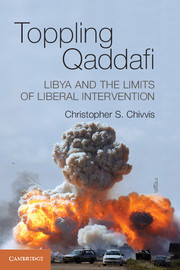Book contents
- Frontmatter
- Dedication
- Contents
- List of Figures
- List of Table
- Foreword
- Preface
- Abbreviations
- 1 Libya and the Light Footprint
- 2 Precipitous Crisis
- 3 The Pivots of War
- 4 Crippling Qaddafi and Infighting over NATO
- 5 Stalemate
- 6 Grinding Away
- 7 Sudden Success
- 8 The Impact of the War and Its Implications
- Appendix A Operation Unified Protector Participating Nations
- Appendix B Operation Unified Protector Basing
- Appendix C Regime Defections
- Appendix D Contact Group
- Bibliography
- Index
- References
5 - Stalemate
Published online by Cambridge University Press: 05 June 2014
- Frontmatter
- Dedication
- Contents
- List of Figures
- List of Table
- Foreword
- Preface
- Abbreviations
- 1 Libya and the Light Footprint
- 2 Precipitous Crisis
- 3 The Pivots of War
- 4 Crippling Qaddafi and Infighting over NATO
- 5 Stalemate
- 6 Grinding Away
- 7 Sudden Success
- 8 The Impact of the War and Its Implications
- Appendix A Operation Unified Protector Participating Nations
- Appendix B Operation Unified Protector Basing
- Appendix C Regime Defections
- Appendix D Contact Group
- Bibliography
- Index
- References
Summary
NATO’s Operation Unified Protector (OUP) thus began with Security Council backing, strong regional support, and a battlefield well prepared by the U.S.-led coalition that preceded it. As many of those interviewed for this study acknowledged, some senior officials in both U.S. and allied governments expected Qaddafi would collapse or capitulate quickly. It was seven months, however, before he was killed and NATO’s mission was brought to a close. In retrospect, a lengthier operation might have been expected given the political and military constraints allied militaries operated under and the tenacity with which dictators have historically held onto power. Nevertheless, it came as a surprise to some key participants, as is too often the case with this kind of war.
Two underlying dynamics would determine success or failure. On one side there was the pace of the rebel advance on the ground; on the other, the strain on allied resources and cohesion, neither of which was great to begin with. The rebel kata’ib needed to take Tripoli before NATO consensus fell apart. The longer Qaddafi held out, the more the fragile consensus within the alliance risked an all-out breakdown and the more the pressure grew to hit Qaddafi harder. But herein lay a central dilemma of the whole operation: if more strikes on Qaddafi might accelerate his demise, they would also increase the risk of civilian deaths and collateral damage, which also could split the coalition apart. NATO thus continued operations at a pace sufficient to give the thuwwar a fighting chance but insufficient to ensure their victory. The result was an apparent stalemate on the ground and a war that dragged out much longer than some officials had expected – or at least hoped would be the case.
- Type
- Chapter
- Information
- Toppling QaddafiLibya and the Limits of Liberal Intervention, pp. 96 - 122Publisher: Cambridge University PressPrint publication year: 2013



